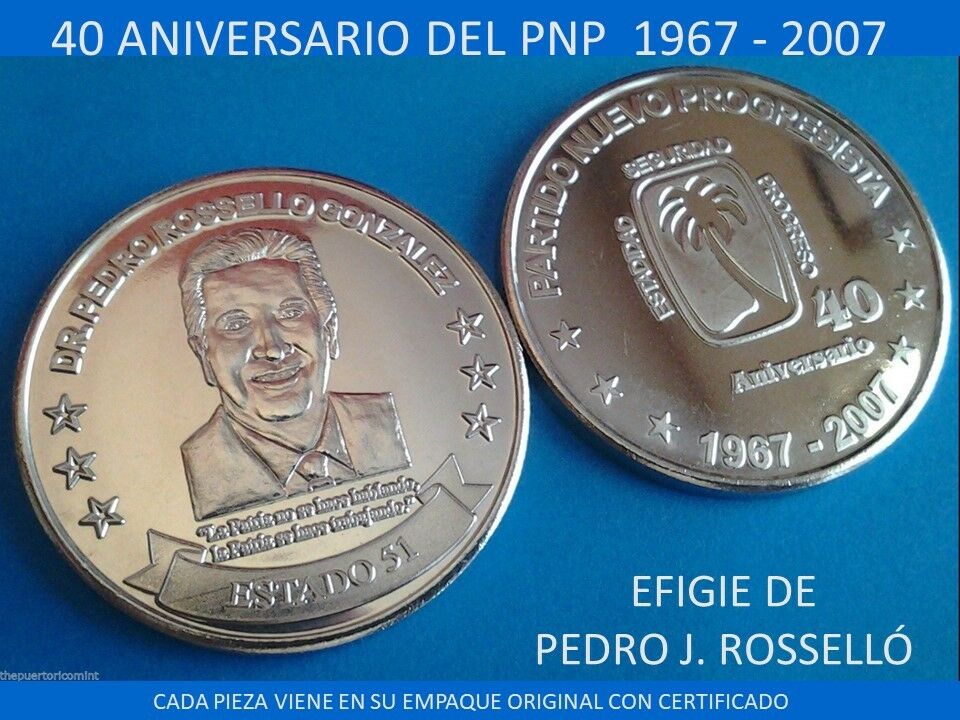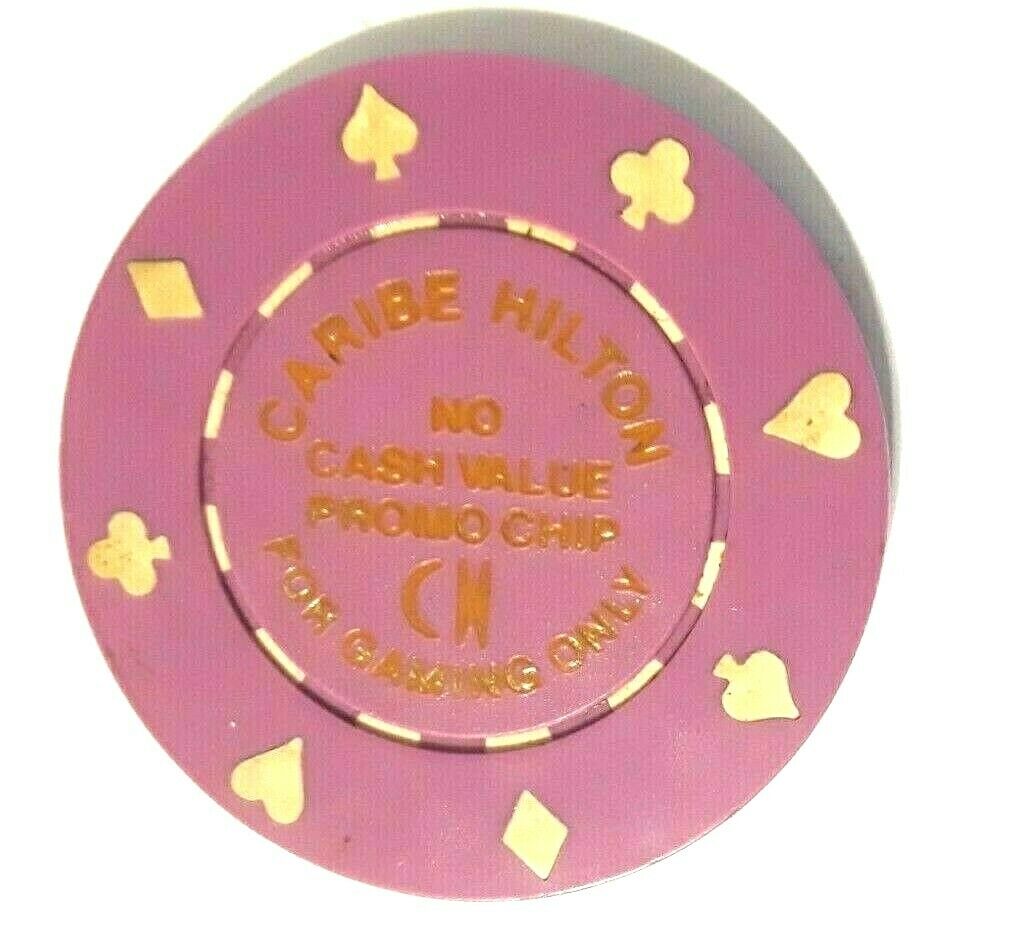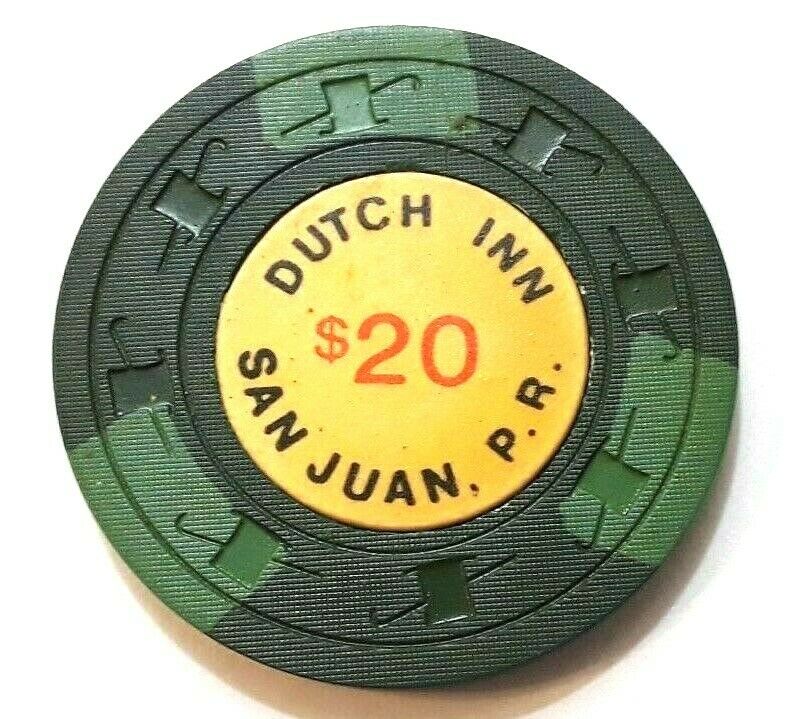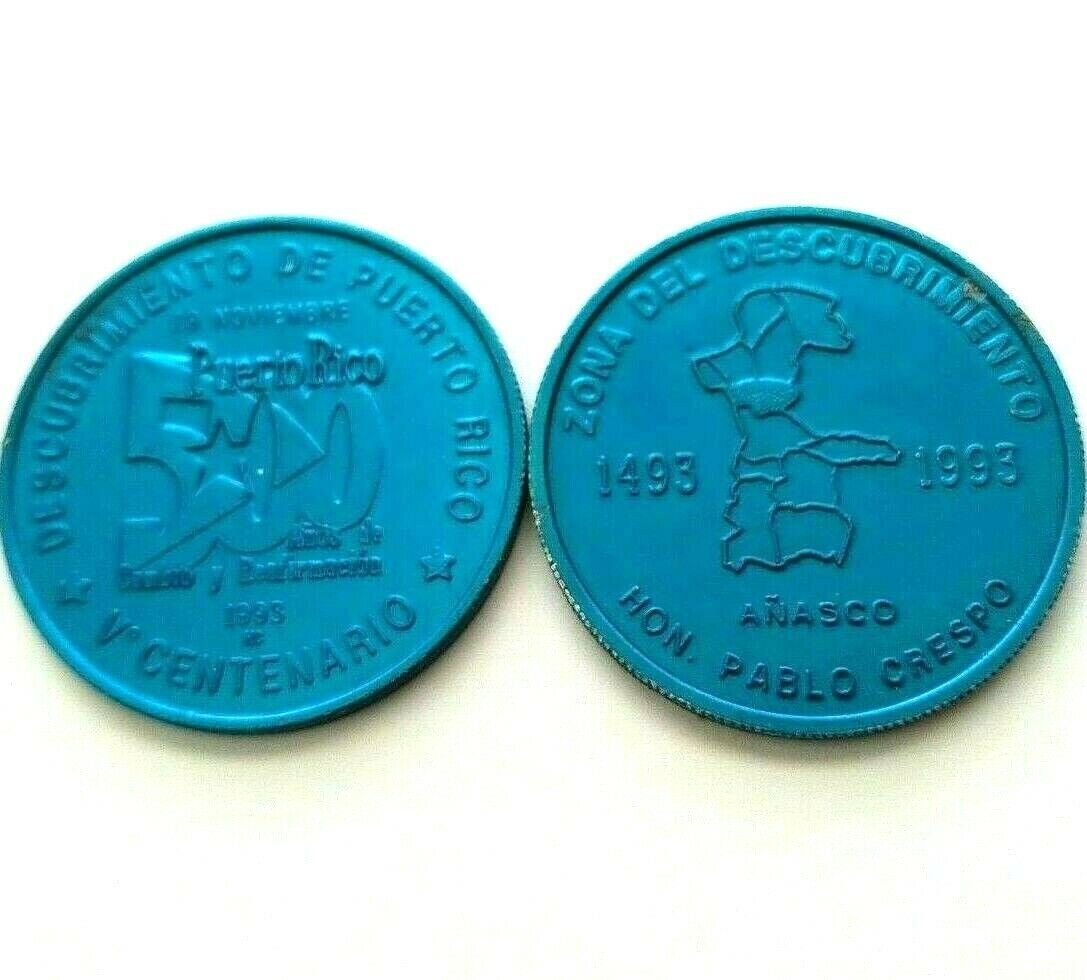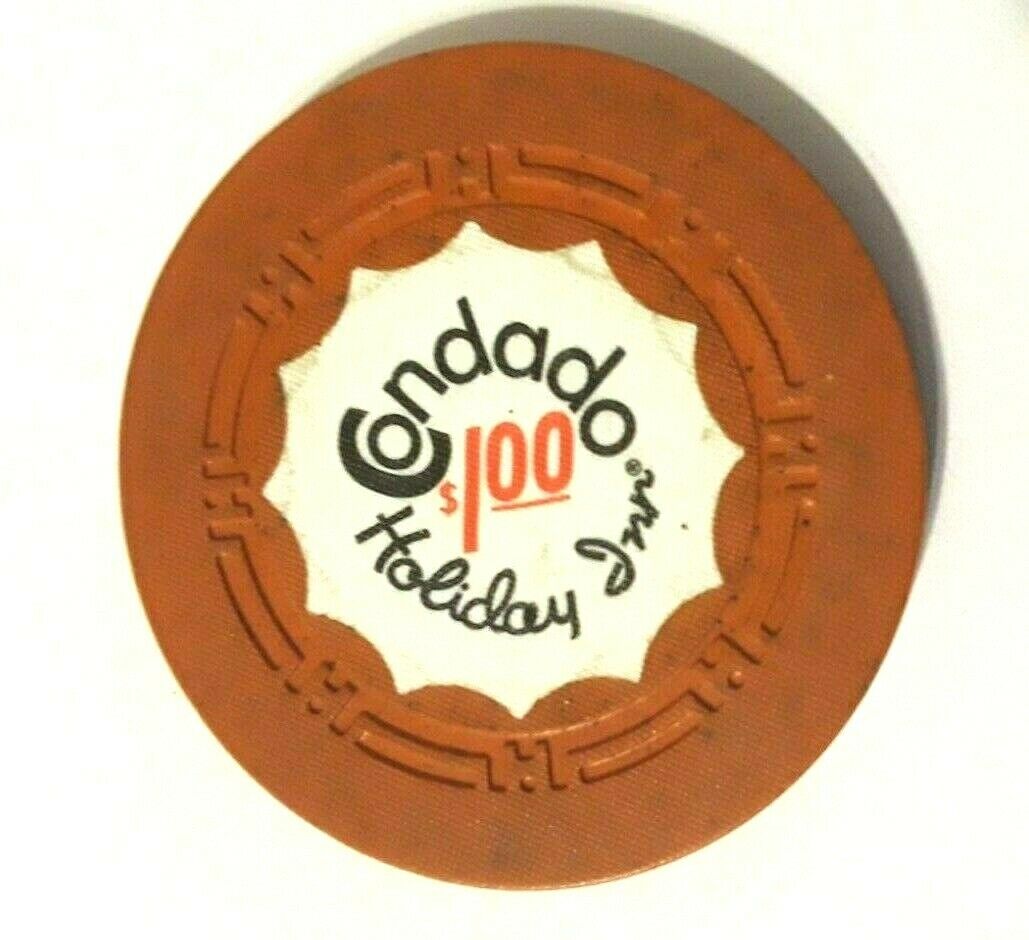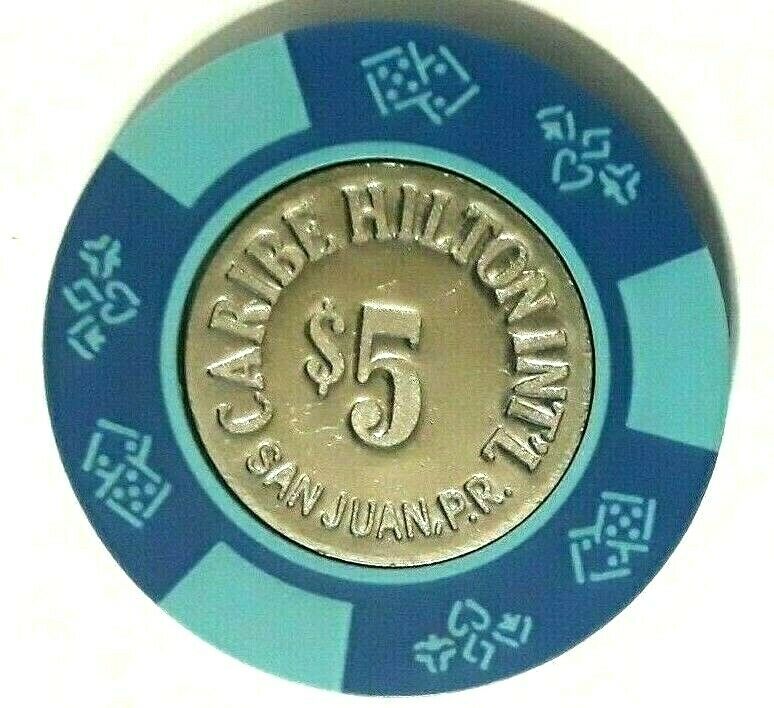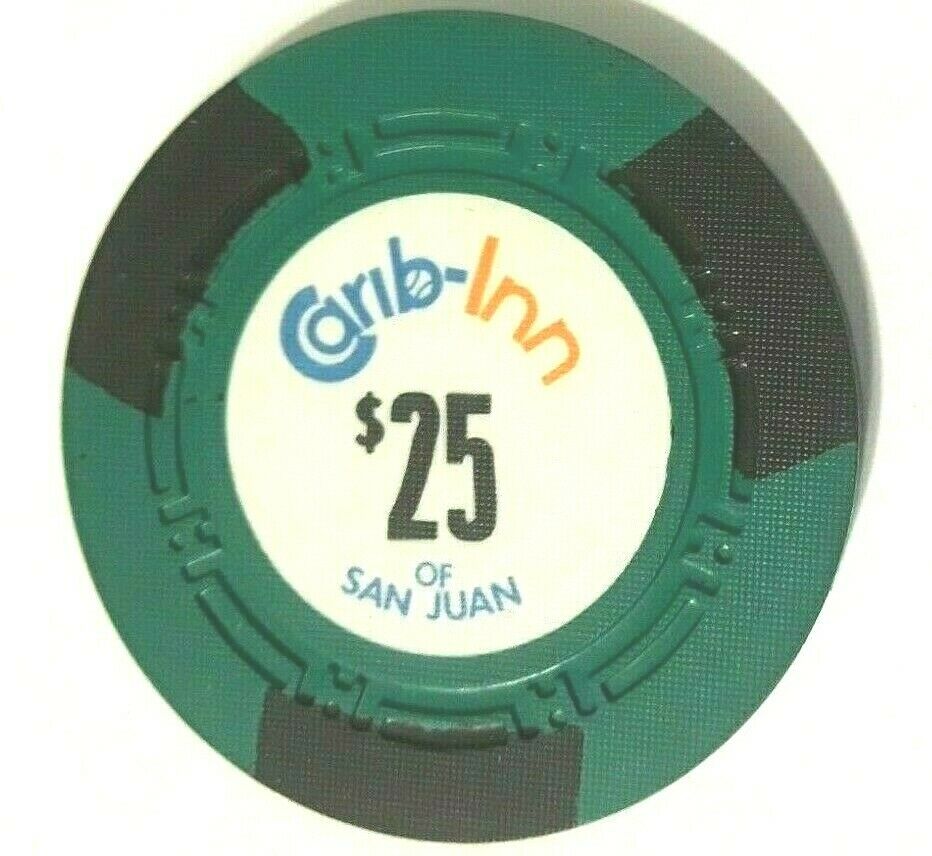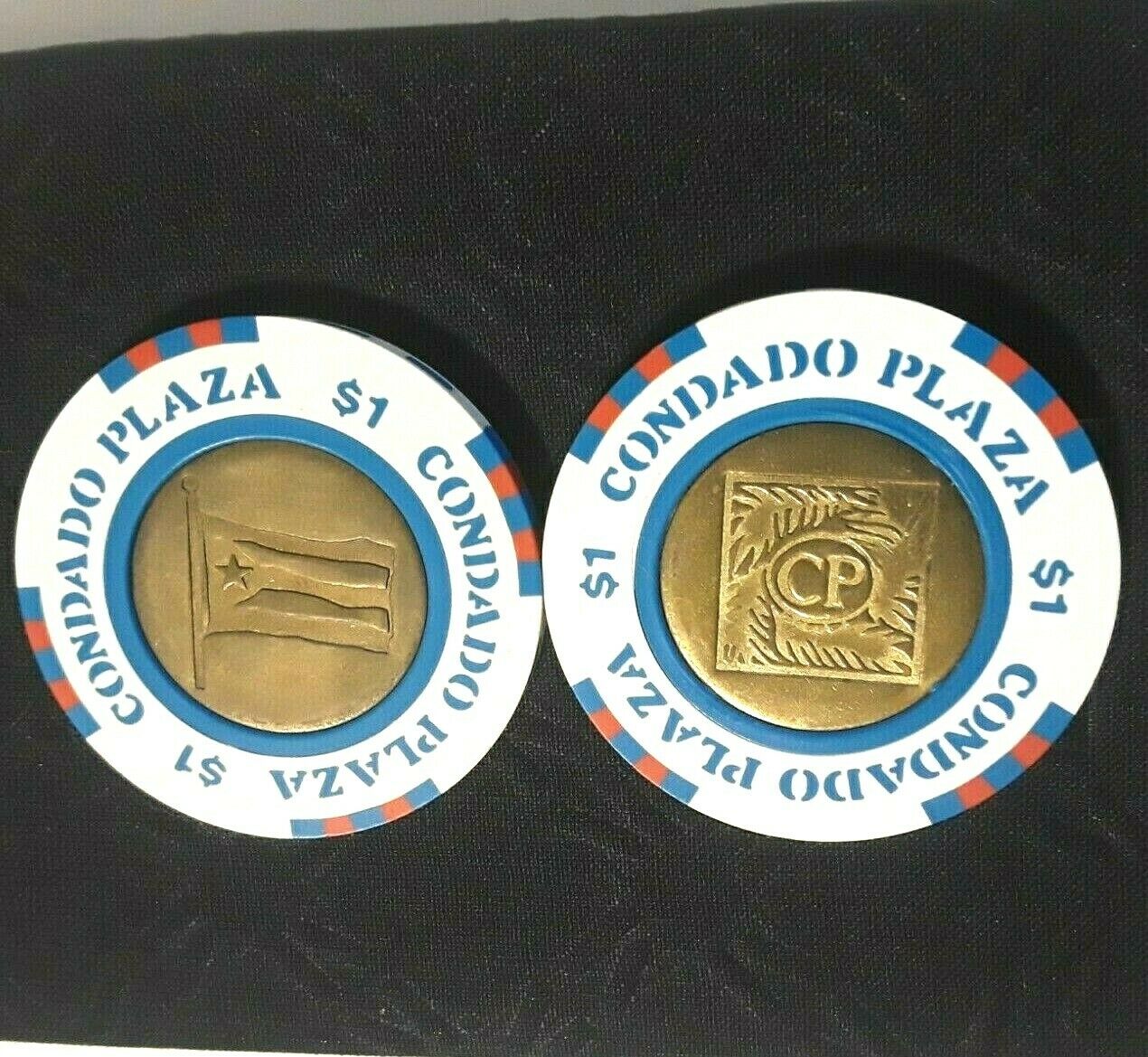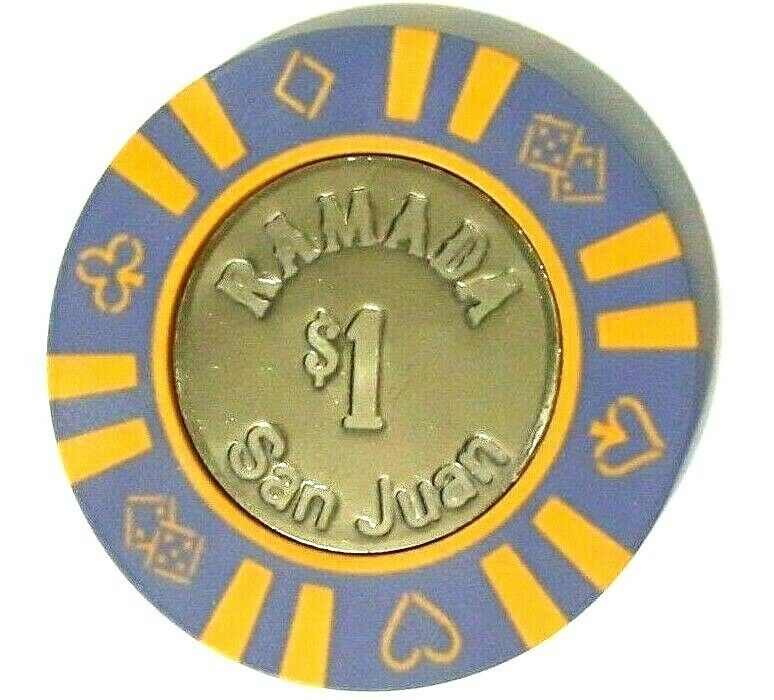-40%
Hon PEDRO ROSSELLO GOBERNADOR PUERTO RICO Governor Partido Nuevo Progresista PNP
$ 9.1
- Description
- Size Guide
Description
40 ANIVERSARIOPARTIDO
NUEVO PROGRESISTA
1967 - 2007
2 VECES
GOBERNADOR
PEDRO ROSSELLO GONZALEZ
1992 - 1996 , 1996-2000
!! BAILA PEDRO , BAILA
BAILA PEDRO BAILA !!
MUY BIEN LOGRADA MEDALLA EN 40mm, 1oz + EN PLATA ALEMANA , DISEÑADA POR UN GRUPO PRIVADO PRO ESTADISTAD & CON LA BENDICION DE LA CUPULA DEL PARTIDO NUEVO PROGRESISTA COMO INICIATIVA PARA RECAUDAR FONDOS EXCLUSIVAMENTE en LA PRIMARIA ROSSELLO - VS - FORTUÑO.
EDICION LIMITADA DE
1,000 PIEZAS, CANTIDAD INFINITAMENTE CHIQUITA PARA UN PARTIDO DE MAS DE UN MILLON DE VOTANTES REGISTRADOS (PARA EL 2004 POSEIA 987,000+)
GRACIAS A UN MUY ESTIMADO AMIGO, TENGO LA SUERTE DE ADQUIRIR UN PEQUEÑO Y MUY PRECIADO LOTE DE ESTAS PRECIOSIDADES.
ENGLISH BIOGRAPHY:
Pedro Juan Rosselló González, M.D.
[pronounced “roh-seh-yóh”] (born April 5, 1944 in San Juan Puerto Rico), was the sixth Governor of the Commonwealth of Puerto Rico from 1993 to 2001. He also served as President of the Council of State Governments as well as Chairman of the Southern Governor's Association, and Democratic Governors Association.
On May 20, 2007, in a meeting of party delegates in San Juan, Rosselló announced his intentions to seek his party's nomination for the gubernatorial elections, scheduled to be held in 2008. On March 9, 2008 he faced Resident Commissioner Luis Fortuño for the New Progressive Party's gubernatorial nomination in the party's primary election. Rosselló lost to Fortuño by a margin of nearly 20 percentage points. The following day Rosselló announced his retirement from active politics, although he made clear his intention to complete his term as Senator from Arecibo.
Education and professional career
After completing his elementary and secondary education at Academia Santa Teresita and Academia del Perpetuo Socorro, both located in San Juan, Rosselló moved to the United States to attend college. He earned his a Bachelor of Science degree, Magna Cum Laude at the University of Notre Dame in 1966, as well as academic distinctions for best student athlete. After graduation, he continued his studies in medicine at Yale University, which he completed in 1970, also graduating Magna Cum Laude. Later he specialized in general and pediatric surgery at Harvard University. Following his residency at Harvard, he practiced medicine in Puerto Rico while also attending the University of Puerto Rico Medical Sciences Campus, where he earned a Master's in Public Health (MPH) degree in 1981 (also graduating Magna Cum Laude). He later earned a graduate degree in Education from the InterAmerican University of Puerto Rico. During his college years, Rosselló became an avid tennis player that led him not only to be named the head of Notre Dame's men's tennis team, but also to play for Puerto Rico's national team in regional championships throughout the Caribbean.
Rosselló started his professional career alternating as an instructor at Harvard Medical School, and as an assistant professor at the University of Puerto Rico, Medical Sciences Campus, where he would later become an associate professor.
He became Chief of Pediatric Surgery and later Chief Surgeon at the University of Puerto Rico Children's Hospital. In 1985, Rosselló was named Health Services Director for the city of San Juan by then Mayor Baltasar Corrada del Río.
Political career
Run for Resident Commissioner
Rosselló began his political career in 1988 when he ran for the post of Resident Commissioner of Puerto Rico, (the island's non-voting observer/representative in the United States Congress) losing to Jaime Fuster of the Popular Democratic Party (PPD). Nevertheless, he was the candidate from the New Progressive Party (PNP) for whom the most votes were cast in the 1988 Elections. This positioned him well to become his party's next leader. After leading a "Statehood Crusade" throughout the islands of Puerto Rico, in 1993 he became president of the PNP, successfully leading an opposition to a referendum sponsored by the then Governor of the island, Rafael Hernández Colón. In 1992 he successfully ran for Governor of Puerto Rico, defeating Victoria Muñoz Mendoza of the PDP.
Governor
As governor, Rosselló launched an anti-crime campaign known as "Mano Dura Contra el Crimen" (literally, "Strong hand against crime") in which the Puerto Rico National Guard was used to assist state police. His administration was also characterized by involvement in big construction and other large-scale government projects which included a train system, dubbed Tren Urbano, and a massive aqueduct system which linked two major water reservoirs on the island. His policies also included a push toward privatization of public entities.
Under his administration, a healthcare reform bill was approved. He led two campaigns for Puerto Rican statehood in 1993 and 1998 in which locally-enacted plebiscites were held to consult the Puerto Rican public on the political status with the United States. He supported the congressional Young Bill, which sought to carry out a referendum in Puerto Rico to define the political status of the island. However, the bill died in committee in the Senate of the United States. Nevertheless, Rosselló carried out a non-binding plebiscite in 1998 which gave electors four options and a fifth None of the Above column. The opposing Popular Democratic Party led a campaign to boycott the plebiscite and called the electorate to vote for the None of the Above column. The boycott was successful, as the None of the Above column garnered 50.3% of the total votes. This opposition was led by Aníbal Acevedo-Vilá, who in 2004 would defeat Rosselló in the gubernatorial elections.
In the 1996 elections he defeated rivals Héctor Luis Acevedo (PPD), who was mayor of San Juan at the time, and Representative David Noriega (PIP), winning a second term after obtaining more than one million votes and the largest victory margin since 1964.
In 1998, a 45% stake of the state-owned Puerto Rico Telephone Company (PRTC) was sold to a consortium led by GTE (now Verizon) and Banco Popular de Puerto Rico, led to a general strike organized by several labor unions. A similar attempt to privatize PRTC in 1988, under then Governor Rafael Hernández Colón, led to a similar strike which doomed the sale. At the time, Rosselló opposed the sale of PRTC by Rafael Hernández Colón. Later, as governor, he decided to sell. His reasoning was that PRTC held a monopoly of the telephone communications industry, therefore a highly profitable asset to the government. Due to implementation of the Telecommunications Act of 1996, which deregulated the monopolies many regional telephone and cable television companies held, the island's telecommunications were opened to competition. Since Rosselló did not view the government as a competitor in the open market, his administration deemed the sale of PRTC desirable and so proceeded. The sale price was 1.5 billion dollars, which union leaders described as "ridiculously low" (PRTC generated about a 100 million dollars of yearly profit at the time of the sale). PRTC had competed for many years with big companies and the technology already in place by PRTC would had cost other companies many billions of dollars to try and emulate.
Vieques controversy
In April 1999, a U.S. Navy bomber misfired its missiles at a practice range and struck the main watch-post on the island of Vieques, killing David Sanes, a civilian employee of the navy. The protests that followed on the small island gathered international attention (see Navy-Vieques protests). Governor Rosselló supported the immediate exit of the navy, appearing before the Senate Armed Services Committee pressing the Senators, among them John Warner and James Inhofe, to immediately take action so that the navy could withdraw its troops from the island. In 2000, Rosselló and then President Bill Clinton signed an agreement that the U.S. Navy would withdraw from Vieques by the year 2003, if voters in Vieques ratified the agreement in a referendum. The agreement included million in public works in Vieques. After Clinton and Rosselló left office, the administration of the next Governor of Puerto Rico, Sila Calderón, preceded the federal sponsored referendum with a local one, a move favored by most residents. However, under increasing pressure President Bill Clinton ordered the Navy to leave Vieques, and the final withdrawal took place on May 1, 2003.
Retirement, return and election results
In June 1999, Rosselló, embroiled in mounting scandals and controversies, announced he would not seek a third term in the elections of 2000. He moved to the Boston area where he taught on the faculty of the JFK School of Government at Harvard University. Later he moved to Virginia, where he first served as a fellow at the Wilson Center and later taught at Johns Hopkins University in Baltimore and George Washington University in Washington, DC. Rosselló claims he temporarily relocated to Virginia, but official records show Rosselló requested a Virginia driver's license and registered to vote in that state, a process which requires that the applicant swear that he is a resident of Virginia. In addition, he filed personal tax returns in Puerto Rico while living in Virginia in which he claimed he was not a permanent resident of the island.
In 2003, Rosselló returned to politics and won his party's nomination for the gubernatorial candidacy in a primary election against his successor as PNP leader, Carlos Pesquera. In the 2004 Puerto Rico Elections the PNP won majorities in both houses of the Legislature, the mayorships of 42 of the island's 78 municipalities and the Resident Commissioner post in the U.S. Congress. However Rosselló was defeated; the position of governor was given then to incumbent Resident Commissioner Aníbal Acevedo Vilá who won by a close margin, and a recount was requested as permitted by law.
During the recount period, Rosselló argued that certain ballots in which voters had made multiple marks were invalid. The ballots in question were cast both for the Puerto Rico Independence Party and Rosselló's New Progressive Party, with individual candidate marks in favor of Acevedo Vila as the candidate for governor of the Popular Democratic Party. The mark indicating the selection of a political party selects that party's slate of candidates by default, but the voter can also select individual candidates from other parties to replace candidates from the default slate.
In this case, the voter was voting for the PIP as a party for the purposes of stating party affiliation and for the PIP's default slate, but had decided to select individual candidates from other party's slates. This type of voting is identified by law in Rule 50 of the State Election Commission's rules, based on the Commonwealth's Electoral Law as amended in 2004, Title 2, Section 2.001, Subsection 3, as a "mixed vote" (this was not a valid mix vote, and it is no longer permitted as valid in the next elections of 2008. This ballot method was also allowed since it was never questioned and seen in the 1996 and 2000 elections, and had never been contested, either by the legislature or by the PNP's Electoral Commissioner. The individual votes for candidates not from the voter's selected party are then deducted from the votes given to the default candidates of the voter's party. The end result is a single vote per candidate, as the law states.
Although the Supreme Court of Puerto Rico had ruled 4-3 that the votes where valid and should be counted, and the marks Rosselló challenged were clearly legal under long standing legislation, Federal district judge Daniel Domínguez (appointed by Rosello's party and federal employees in Puerto Rico have a history of favoring all decisions towards the PNP party) ordered the votes be counted but not tallied until he reached a final decision on the matter. The U.S. Court of Appeals for the First Circuit would later determine the federal district court lacked jurisdiction on the matter, and furthermore ruled Dominguez had grossly overstepped the bounds of his authority. The case was returned to the Supreme Court of Puerto Rico and the disputed votes were counted and tallied. On December 28, 2004 Acevedo-Vilá was certified as the elected Governor of Puerto Rico.
Senator
Rosselló was able to gain a seat in the Senate of Puerto Rico when Victor Loubriel, an elected first-time district senator representing Arecibo, decided to quit his seat two days after being sworn. Opposition parties, and even people within Rosselló's own party, denounced the elected senator's resignation as being pressured by activists from his party so that Rosselló could fill in his vacancy thus providing him a platform from which to challenge the Acevedo-Vilá administration. On other hand, a huge percentage of people from his party, decided to endorse his candidacy for this seat.The senator's resignation gave the New Progressive Party a seat it could fill, so Rosselló announced his intentions of filling the vacancy and officially assumed duties as a Senator of Puerto Rico on February 13, 2005.
Prior to assuming office, Rosselló announced his intentions to remove Senate President Kenneth McClintock and be elected to replace him. An internal power struggle within the New Progressive Party between Rosselló and McClintock led to a split within the NPP Senate delegation in May 2005. After a caucus meeting, eleven of the seventeen senators elected by the New Progressive Party voted for Rosselló, with the other six boycotting the meeting. McClintock and five other senators, Orlando Parga, Luz Arce, Migdalia Padilla, Carlos Díaz, and Jorge de Castro Font, refused to follow the caucus' decision, denying the unanimous consent required by Senate Rules 2 and 6 to remove a President, thus permitting McClintock to remain as Senate President. The party directorate subsequently recommended that McClintock, Parga, and de Castro Font be expelled from the Party, and that Arce, Padilla, and Díaz be censured and prohibited to run for re-election under the party's flag or logo. However, in August 2005 the party's General Assembly only took action to expel de Castro Font, leaving the status of McClintock and the other four senators in limbo after approving in August 2006 a generic censure resolution that did not name any officeholders by name. The sanctions were nullified by San Juan Superior Court Judge Oscar Dávila Suliveres on May 8, 2007. The Supreme Court of Puerto Rico, in a 5-to-1 decision, affirmed the lower court decision.
On January 16, 2007, Rosselló led the party caucus in the Senate to a reprimand of two more NPP senators, fellow Arecibo senator José Emilio González and Bayamón senator Carmelo Ríos for voting in favor of a concurrent resolution proposing a constitutional amendment that would turn Puerto Rico's bicameral legislature into a unicameral legislative system, increasing the number of reprimanded caucus members to eight of the total of sixteen elected in 2004. Both González and Rios have expressed their lack of concern over the reprimand.
March against U.S. colonialism in Puerto Rico
On February 21, 2006, Pedro Rosselló set out to make a stand against what he calls "U.S. persistent colonialism in Puerto Rico" by organizing a "March for the End of Colonialism" (La Marcha por el Fin de la Colonia) in an effort to emulate what Mahatma Gandhi and Martin Luther King Jr. did at the Salt March, did in the Selma to Montgomery marches, respectively. Rosselló's comparison to the two civil rights leaders caused criticisms from the press and many others throughout the island.
The stated purpose of the march was to expose the colonial status of Puerto Rico, and exhort the United States Congress to pass a bill that would allow the self-determination of the people of Puerto Rico, with congressionally mandated non-territorial, non-colonial options. Rosselló is a vocal and prominent supporter of statehood for the island, wanting Puerto Rico to become the 51st state of the (United States). The march covered the complete perimeter of Puerto Rico, tracing its coastline for 16 days and 271.3 miles. The United States Congress has not acted on any requests from the march's organizers.
NPP Presidency
On June 7, 2007, Senator Rosselló officially ended his bid for the Senate Presidency, stating in an article in El Vocero newspaper that he was no longer interested in the post, held since 2005 by fellow party member Kenneth McClintock. On April 19, 2007, he published a third book, El Triunvirato del Poder, (The Triunvirate of Power) on the power centers that he believes control Puerto Rico's economy and government.
On April 28, 2007, Rosselló revealed to various party leaders that in March, 2006, he had signed a sworn statement assuring that he would not make a fourth run for the governorship in 2008, and that he intends to abide by the result. During the April 25, 2007 U.S. House Subcommittee on Insular Affairs hearing on Puerto Rico's political status, he was seen treating McClintock very cordially, which suggests that the tension levels between them have eased somewhat, suggesting he may want to help reunite the party as it prepares for the 2008 electoral campaign against incumbent Governor Aníbal Acevedo Vilá and assume a different non-elective role within the statehood movement to which he has devoted nearly two decades of his life. However, in those hearings, he acted very aggressively and departed immediately after finishing his statement. Since this occurred several days before announcing he would not seek another run for governor, many speculate that his attitude reflects his frustration that he couldn't achieve statehood for the island and his feelings that he had become a "lame duck" politician.
2008 NPP Governor's Candidacy Primary
During a PNP assembly on May 22, 2007 a large group of delegates unanimously acclaimed him as the party's candidate for Governor. Interpreting this call as a call of the party as a whole, he officially announced that the would run for Governor for the fourth time in 2008. His candidacy papers were filed at the State Elections Commission on June 1, 2007. His candidacy was contested by Luis Fortuño, the current Resident Commissioner of Puerto Rico, with whom he had shared the ballot in 2004. Fortuño has also announced officially his pre-candicacy for the party's nomination for governor.
In March 9, 2008, Rosselló conceded the victory to Luis Fortuño after a large margin of votes in favor of his opponent. Rosselló admitted defeat even before the votes were completely tallied claiming Fortuño as the next candidate of the PNP party, and said the following: "Thank you all for being here, in this day when the people of our Party have made a decision. I am thankful for your presence here, because to me it means that our dream still lives on. The people spoke, and their voice said that Luis Fortuño must be the candidate our Party presents for governor, and the one who leads our Party as its President. The people spoke, and I must obey them. I want to congratulate Luis Fortuño, for taking his campaign to the people and obtaining their favor. Everyone of us should follow the voice of the people. I congratulate him and I wish him success leading this Party and taking our ideals to new thriumps. I see in your faces what this decision of the people means to you, but I am grateful to you for fighting together with me along the path. Later on, I expect to say thanks to each of you individually. I am thankful from the bottom of my heart".
On March 10, 2008, Rosselló sent the media a written statement regarding his future in which he confirmed he will be retiring from active politics and will not be campaigning for any candidate, however he will finish his term as senator.
Four months after the primary, he has yet to endorse Fortuño, his party's gubernatorial nominee. A write-in movement was started on the week of the primaries, to nominate Rosselló for Governor of Puerto Rico. He has yet to say wether he will become involved or deauthorize the movement.
Gubernatorial library
Groundbreaking ceremonies on November 7, 2007, fifteen years after his first election as Governor, marked the beginning of the construction of the Pedro Rosselló Gubernatorial Library at Turabo Univsrsity's campus in centrally-located Caguas, Puerto Rico. To be built at a cost of .5 million, half of that through legislative appropriations, Puerto Rico's second gubernatorial library will house documents currently stored in 5,000 boxes. While the library is built, a reenactment of former Gov. Pedro Rosselló's office at La Fortaleza, the Governor's Mansion, has been built on campus and is open to the public. Former First Lady Maga Rosselló participated in the ceremony, as well as the Ana G. Méndez University System president José Méndez.
Personal Life
Rosselló married Irma Margarita "Maga" Neváres on 1969. They have three sons: Oscar, Luis Roberto, Ricardo, and several grandchildren.
Publications
Campos, Cielos y Flamboyanes: Con Pedro Rosselló de 1988 a 1997.
El Status es el Issue - biography written by Alberto Goachet and authorized by Rosselló.
The Unfinished Business of American Democracy.
El Triunvirato del Terror.
ENVIO / SHIPPING :
EMPAQUE /
PACKAGING
Enviamos dentro de mica, cartón, cápsula, o protector acrílico, envuelto entre cartón grueso o burbuja, dentro de sobre o caja sellado con cinta adhesiva a los 4 lados. Haremos todo lo posible por resolver su problema y ganar su satisfacción. Algunas medalla o moneda quizá sea enviada en cápsula de acrílico como cortesía nuestra. Debido a que usted pagó por la medalla o moneda, y no por la cápsula, nosotros no somos responsables de reemplazar cápsulas recibidas rotas. Debido a que las medallas vienen con alguna que otra imperfección de fábrica, es normal que una medalla contenga algún rayacito o cantacito mínimo de lo cual no somos responsables. Las antiguedades que vendemos tienen imperfecciones por vejez, uso y desgaste, que pudieran no reflejarse en las fotos. Por eso sólo reemplazaremos o devolveremos dinero en caso de mercancía recibida gravemente dañada. Clientes que abusen con reclamaciones exageradas e infundadas serán bloqueados en el futuro.
Items are put inside plastic wrap, coin flip or capsule, foam insert, card protector, bank note jacket, FDC jacket, or similar protective method, then shipped padded within card board or bubble wrap inside an envelope or box. We’ll do everything we can to help you and get your 5 stars. Some medals or coins may be shipped inside plastic capsules as a courtesy of ours. Because you paid for a medal or coin, and not for an acrylic capsule, we are not to be held responsible over capsules received cracked or broken. Medals received from the factory will feature minor scratches or nicks over which we shouldn't be held responsible. Likewise, vintage items we sell may feature imperfections due to age, tear, and wear, which may not reflect on the photos. Due to this, we will only replace or provide refund on items received greatly damaged. Clients maliciously seeking to take advantage of the system by placing bogus or exaggerated claims will be blocked from making future business with us.
GASTOS DE ENVIO
/ SHIPPING CHARGES
SUBASTAS pagan envío: 1er ítem gano pagará .99 o más; cada ítem adicional pagará .99 de envío.
(a menos que se indique lo contrario)
AUCTION ITEMS will pay: 1
st
Auction item won pays either .99 or MORE. Each additional item will pay .99 each.
(unless otherwise noted)
EXTRANJEROS /
INTERNATIONAL BUYERS
Para más seguridad y proteger su inversión, utilizamos el Sistema de Envío Global Ebay. Si desea método alterno debe informarme antes de comprar. El comprador pagará los gastos de envío, incluyendo seguro y c
ódigo de seguimeinto. NO ENVIAMOS SIN SEGURO PAGO.
To insure your investment, we use Ebay’s Global Shipment system. If you want another method we must be asked prior to any purchase. Buyers will pay all shipping charges, to include insurance and tracking.
WE WON’T SHIP ITEMS UNINSURED!
PAGO TARDE /
LATE PAYMENT POLICY
Para facilitar y aligerar el proceso de envíos, hemos automatizado nuestro sistema de cobro: EBay procesará todo comprador malicioso que no haya saldado su compra en 7 días.
Due to the large amount of items being sold, and to streamline expedient shipping process, effective APRIL 3, 2014 Ebay's automated non-payer assistant will start processing orders not paid within 7 days of purchase.NO EXCEPTIONS!
TIEMPO DE ENVIO /
WAITING TIME
Todos los artículos serán procesados y enviados dentro de 10 dias laborables a partir de la fecha de pago. Visitamos el correo sólo 1 vez por semana, y NO somos responsables por artículos que tarden más de lo debido por culpa del sistema postal. CON SU COMPRA, USTED APRUEBA LO ARRIBA ESCRITO Y SE COMPROMETE A NO QUEJARSE POR RETRASOS EN EL RECIBO DE SUS ARTICULOS, SOBRE LO CUAL NO TENEMOS CONTROL.
All items will be processed and shipped within 10 working days from date paid. We ship items only Once a week, and we are definitely not liable for items that might take longer to arrive than expected due to our postal system’s mismanagement. BY PURCHASING FROM US YOU UNDERSTAND OUR POLICIES, AND YOU AGREE NOT TO FILE ANY MALICIOUS COMPLAINT IN REGARDS OF ANY DELAY INCURRED, OVER WHICH WE HAVE NO CONTROL.
CANCELACION /
PURCHASE RETRACTION
No cancelamos compras, favor seguir reglas de Ebay.
Se puede retraer una puja de artículo en subasta a más de 12 horas antes de terminar la subasta. Se puede retraer una puja de artículo en subasta a menos de 12 horas antes de terminar la subasta, únicamente si se retrae la puja en menos de 1 hora de cometido el error y a más de 1 hora de que cierre la subasta.
Toda compra a de artículo a precio fijo necesita del cliente una aprobación de la compra. Una vez el cliente confirma la compra del artículo a precio fijo, el cliente queda comprometido a pagarla.
No Purchase Cancellation Allowed
:
Please remember that every bid is binding. Bidding on multiple identical items should be done only if you intend to buy all of the items. A bid on eBay is considered a contract, and you're obligated to purchase the item.
You can retract from bidding if the listing ends in more than 12 hours, or if the listing ends in less than 12 hours, but only if you retract the bid within one hour of placing it. No retraction is allowed within the last 59 minutes of an auction closing.
You cannot retract a purchase made through a Buy It Now listing. Once you confirm your purchase, you are obligated to pay the seller.
